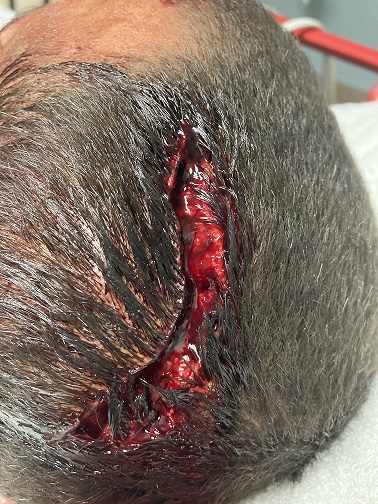
WARNING: I’ve attached a photo of Justin’s head cuts at the bottom of this blog. Be warned that the photo is graphic.
(2-11-22) Frances Musgrove’s adult son, Justin, wandered out onto a highway and was struck by a car. The photo of his head wound is jarring to see. It should disgust those responsible for not helping Justin – and there is a long list who have thrown up their hands and blamed regulations and the law. When Justin was ordered by a judge to be under an Assisted Outpatient Treatment order, Frances thought he would get help. She was wrong. Justin didn’t comply and the law proved meaningless. His mother has waged a one-woman tireless campaign to get her son into a state hospital where he can be stabilized.
Why can’t Austin help this man who has been hospitalized more than 70 times? What if he were your son, your brother, your father, your uncle, your husband?
Frances told me today that Justin will not take a shower because he believes the water is poisoned. “I’m very worried about infection. The ombudsman with human health services is telling me the state hospital will not take him because they don’t know if the psychosis is due to drug abuse or mental illness and they’re not equipped to help with substance abuse.”
I’ve posted the emails of officials, who are supposed to be helping Frances, at the bottom of this blog. Feel free to send this article to them. In January, Frances talked to Alex Stuckey, a reporter with the Houston Chronicle.
Mentally ill man was supposed to get help. Now he is homeless in Austin.
His mother wants to know why.
By Alex Stuckey, Originally published in The Houston Chronicle.
Frances Musgrove bundles against the chill and drives around Austin every few days, searching for her son under highway overpasses and alongside busy thoroughfares.
She doesn’t always find him. There are a few spots he frequents, where he knows he can get meth, but he’s not always there.
It’s often a multi-hour drive, Musgrove holding her breath every time she sees a man of his build; a man with his blanket; a man who seems out of his mind.
She can’t believe it’s come to this.
Justin Brodmann, 40, was supposed to be getting help through a program called Assisted Outpatient Treatment, which would provide court-ordered care for his debilitating bipolar disorder in the community. The federally funded program, operated by Integral Care — the local mental health authority in Austin — is specifically for individuals like Brodmann who have been hospitalized, arrested and/or homeless numerous times because of their mental illness.
But Integral Care has stopped helping Brodmann and left him on the streets, Musgrove alleges in a complaint she filed this week with the U.S. Department of Health Human Services Office for Civil Rights.
Redacted complaint confirmation by Houston Chronicle on Scribd
“Discrimination has been ongoing and constant,” Musgrove, who lives in Austin and is retired, wrote in her complaint. “The first two weeks of this homelessness, (Integral Care) did not even engage with him, and when I went looking for him I found him without much difficulty, digging through a trash can to find something to eat.”
Integral Care did not immediately respond to a request for comment.
IN CRISIS: Texas’ supposed safety net for mentally ill not helping many of those in need
Brodmann, who has been hospitalized for his mental illness more than 70 times in his life, was featured in the Houston Chronicle’s investigation,In Crisis, published last year. The investigation found that there aren’t nearly enough beds — private or state-funded — to help everyone in need, forcing mentally ill Texans to seek out crisis care through emergency rooms and, often, the criminal justice system. Though the state has tried in recent years to fund the addition of hundreds of psychiatric beds to lighten the load, there still were about 1,800 people waiting to get into a state-run hospital as of October.
In summer 2020, Integral Care was awarded federal funds for the Assisted Outpatient Treatment program, with a goal to “bridge the gap between inpatient and outpatient mental health services, improve treatment outcomes and reduce incidence of inpatient psychiatric and reduce criminal justice involvement.”
Through the Substance Abuse and Mental Health Services Administration grant, the mental health authority receives $1 million of funding each year for four years. Harris County also has a federally funded Assisted Outpatient Treatment program.
Brodmann was placed in the program in January 2021, court documents show, and his treatment plan specifically states that he could go back to a mental hospital “if you do not follow your treatment plan; if your doctor and case manager believe you are getting sick again and you could be a danger to yourself or others.”
But by March, Musgrove received an email from Integral Care’s ombudsman, Phyllis Wolf, saying that his order for treatment was suspended.
“Since Justin wasn’t motivated to participate by the court order and isn’t taking meds, the Judge isn’t willing to extend the order and is letting it expire,” Wolf wrote. “We have attempted to meet with Justin … 3 times per week for safety reasons (with us cabbing him there and back) but he has declined.”
She continued that the plan was to “attempt to collaborate with him” to establish goals and the service package he would like to use moving forward.
Brodmann was placed under another outpatient treatment order in September, court documents show.
Two months later, he had left his supportive housing and began wandering the streets, Musgrove said.
She was infuriated. She felt like Integral Care wasn’t being communicative with her, or implementing the program appropriately.
In December, she emailed the mental health authority asking why he hadn’t been committed to a mental hospital yet.
“The judge requires that the same criteria be met (imminent danger) to send a person back to the State Hospital,” Wolf wrote. “I was confused by that too and she went on to relay that the judge sees AOT as incentive based not punitive.”
Under Texas law, failing to comply with AOT is not grounds for inpatient commitment, said Greg Hansch, executive director for the National Alliance n Mental Illness Texas. However, Integral Care could file a petition for inpatient commitment or the probate court judge could order commitment if a patient meets the criteria. Texas requires a person be a danger to themselves or others or is suffering severe mental, emotional or physical distress and therefore cannot provide for their own basic needs or make rational decisions about whether they need treatment.
The law doesn’t include psychiatric deterioration, or harm without further treatment, as a separate type of danger to self — something advocates tried and failed to address during last year’s legislative session.
Integral Care “has failed to report to the judge overseeing his outpatient commitment that Justin has deteriorated to the point where he should be re-hospitalized for supervised treatment,” Musgrove wrote in her complaint. “They continue to ignore that deterioration is a separate standard for commitment in Texas from harm to self or others.”
Musgrove is at a loss for what to do. This month, she fired off a letter to advocates and Travis County judges begging for help — asking that her son be committed to a mental hospital again.
Travis County Probate Court judges Guy Herman and Dan Prashner responded in kind, saying that they have “nothing but sympathy for a mother’s pain for her son suffering from” severe mental illness. Both judges were involved in Brodmann’s AOT orders.
Letter Responding to AOT Program Concerns by Houston Chronicle on Scribd
“But what she wants a court to do cannot be done under the law that governs outpatient mental health programs, because even people with (severe mental illness) have rights that courts are required to respect,” they wrote. “The era of forcing people with (severe mental illness) into hospitals solely because it may be in their best interest is long past.”
Musgrove doesn’t understand why living under a highway doesn’t meet the dangerous to self or others requirement under Texas law. She’s considered moving to a state with more stringent commitment standards to get her son help.
But how would she get him in a car? And would it be safe?
So, she brings him food when she can. She gets him to change his shirt when she can.
But often, he thinks he’s in Iraq even though he never served in the military. Often, he’s aggressive.
All she can do now is wait.
Wait for him to want help.
Wait for him to walk into traffic.
Wait for him to overdose.
Wait for him to die.
Alex Stuckey is an investigative reporter for the Houston Chronicle. You can reach her at alex.stuckey@chron.com or Twitter/com/alexdstuckey.
About the author: Alex Stuckey
Alex Stuckey is an investigative reporter for the Chronicle. Stuckey won a Pulitzer Prize in 2017 for her work on a project examining the rampant mishandling of sexual assault reports at Utah colleges while working for The Salt Lake Tribune. She came to the Chronicle shortly thereafter to write about NASA, science and the environment.
Stuckey is an Investigative Reporters and Editors award winner and a Livingston Award Finalist. She has won a Sigma Delta Chi Award for Excellence in Public Service Journalism and a Frank A. Blethen Award for Local Accountability Reporting. She also has won a Society of Professional Journalists Don Baker Investigative Reporting Award.
An Ohio native, Stuckey has lived in five states since graduating from Ohio University’s E.W. Scripps School of Journalism in 2012. She loves yoga, reading and elephants. She shares a birthday with Ruth Bader Ginsburg (girl power!) and the late Alan Bean, fourth man to walk on the moon.
She likes puppies more than people.
WARNING GRAPHIC IMAGE DISPLAYED TO SHOW THE SERIOUSNESS OF JUSTIN’S PREDICAMENT.

Justin wandered into street and was struck.



